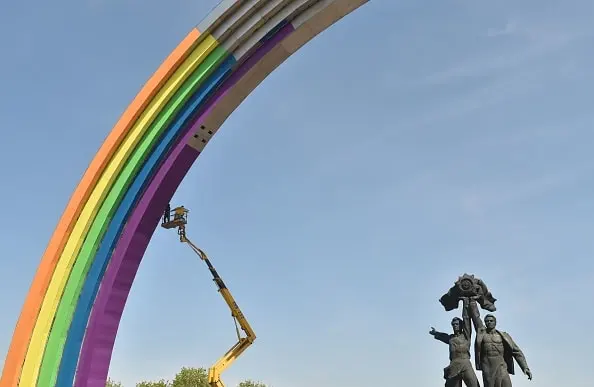Ukraine repaints Russia ‘friendship’ monument as a rainbow to celebrate diversity

A Soviet-era ‘friendship’ monument in the heart of Ukraine’s capital city has been repainted as a rainbow ahead of the Eurovision Song Contest.
The country’s capital Kyiv is gearing up to host next week’s Eurovision Song Contest, which has the theme of ‘Celebrate Diversity’.
As part of the preparations for the event, Kyiv’s mayor Vitali Klitschko gave the go-ahead for a historic Soviet-era monument in the city to be repainted as a rainbow.
The Friendship of Nations Arch, which sits in the heart of the capital city, was originally dedicated to the unification of Ukraine and Russia within the Soviet Union.

Russia might not be too pleased about the re-appropriation of the monument, which is becoming the ‘Arch of Diversity’ to mark the start of the Eurovision.
It also serves as a symbol for the city’s LGBT community ahead of Kyiv Pride, which is set to go ahead in June. It is only the third year that the Pride event has been held.

Gennadiy Kurochka of CFC Consulting, the PR company helping organise the Eurovision festivities, explained: “The Arch calls to celebrate diversity. Diversity in all its meanings: racial, linguistic, musical, sexual.
“Everyone sees a unique aspect of diversity, when looking on this art piece.
“I consider the Ukrainian society to be free and open-minded enough to respect any manifestation of diversity, which we tried to convey via this art piece.”
CFC had claimed the top of the rainbow will remain unpainted “to symbolise Ukraine’s efforts to break away from its past and “pave it’s own path as an independent European state”.
However, other reports cast doubt on the claim, suggesting the monument was actually left partially-painted after demonstrations from anti-LGBT groups.
A far-right group that led protests had claimed: “The perverted symbolism that has spoiled the colours of the rainbow has provoked indignation among Ukrainians with traditional values.”
Mayor Vitali Klitschko told Reuters that as part of a “compromise”, with the group, the unpainted part of the arch “will be covered with a Ukrainian decorative pattern”.
In recent years a number of Soviet-era monuments have been dismantled in Ukraine, following the country’s 2014 pro-European revolution.
Ukraine’s relations with Russia remain at extreme lows amid ongoing conflicts in eastern regions, where Russia stands accused of propping up separatists in order to destabilise the country.
The Ukrainian peninsula of Crimea was annexed by Russia in 2014 – a conflict which has unexpectedly come to the forefront of Eurovision.
The song contest was thrown into crisis when Ukraine’s security services announced that Russian contestant Yulia Samoylova has been banned from the country, and would not be permitted to attend.
Her ban came after revelations that she has performed in Crimea since Russia’s annexation. All people known to have travelled to Crimea via Russia are banned from Ukraine, as they are considered to have illegally entered Ukrainian territory.
After the European Broadcast Union was unable to resolve the dispute, Russia announced it would snub the contest entirely.
Reigning Eurovision champ Jamala won the contest in 2016 with a politically-charged song based on the Soviet-era ethnic cleansing of Crimean Tatars.

